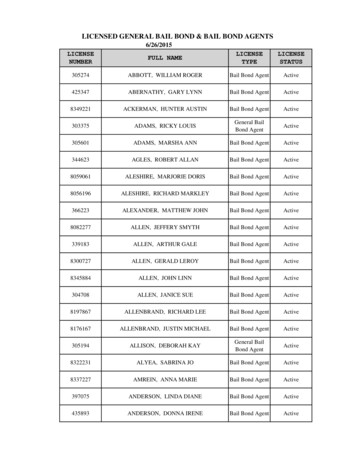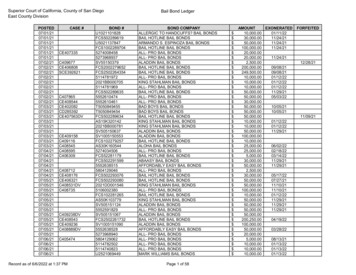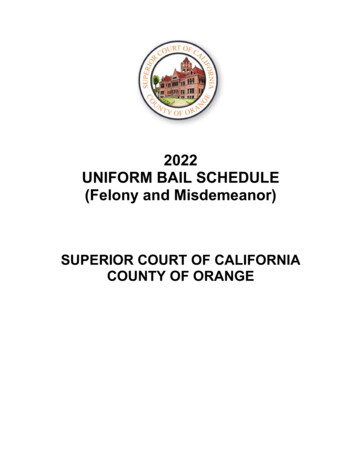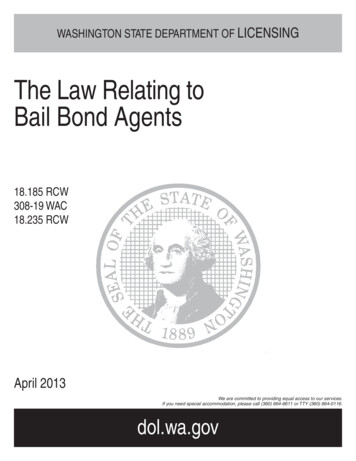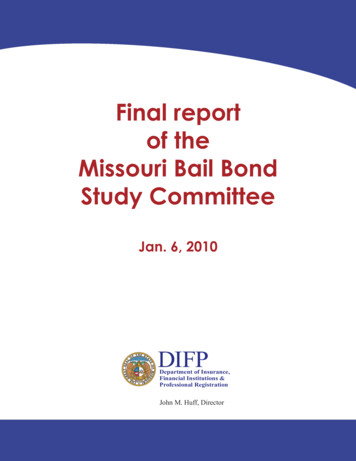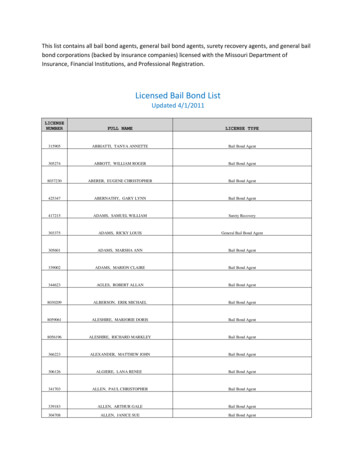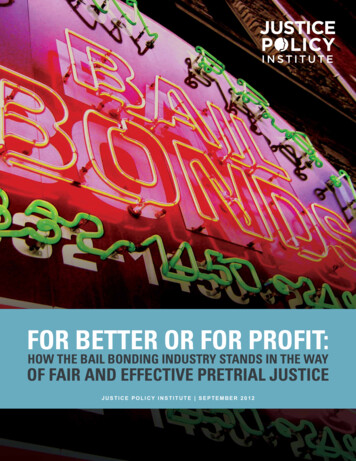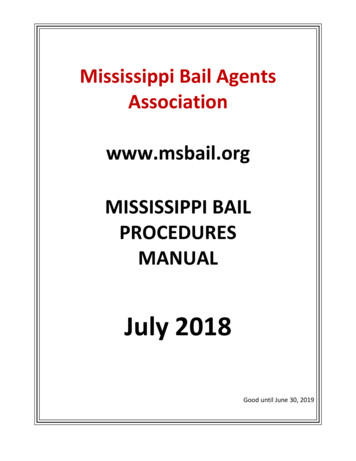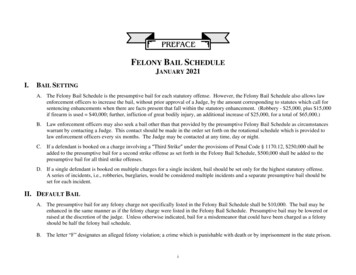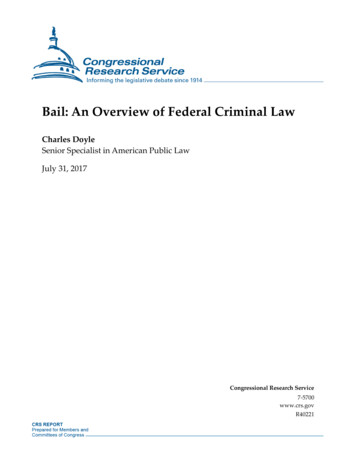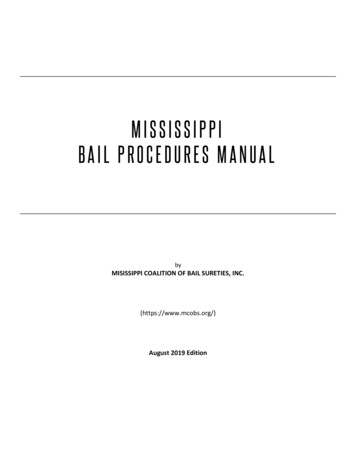
Transcription
MISSISSIPPIBAIL PROCEDURES MANUALbyMISISSIPPI COALITION OF BAIL SURETIES, INC.(https://www.mcobs.org/)August 2019 Edition
INTRODUCTION . 4SECTION 1: WHAT ARE THE REQUIREMENTS FOR ACCEPTING A BOND? . 5SECTION 2: WHAT HAPPENS WHEN A BOND IS FORFEITED? . 7SECTION 3: WHAT HAPPENS WHEN A DEFENDANT JUMPS BOND? . 10SECTION 4: HOW DOES A BOND BECOME DISCHARGED? . 11SECTION 5: MS Code (Section 83-39) – Bail Bonds & Bondsmen . 12§ 83-39-1 – Definitions . 13§ 83-39-3 – Individual license required. 14§ 83-39-7 – Qualification bond; return of Defendant out on bond . 16§ 83-39-8 – Transfer of qualification bond . 17§ 83-39-9 – Issuance of license . 18§ 83-39-11 – License fees . 18§ 83-39-13 – Annual reports required . 18§ 83-39-15 – Grounds for denial, suspension, revocation, and refusal to renew license . 19§ 83-39-17 – Hearing. 20§ 83-39-19 – Appeals . 20§ 83-39-21 – Judicial proceeding in lieu of departmental hearing . 20§ 83-39-23 – Notice to sheriff and judicial officials . 21§ 83-39-25 – Maximum premium, commission or fee; processing fee; holding collateral to insure payment of premiumor indemnify for losses. 21§ 83-39-27 – Prohibited activities . 22§ 83-39-29 – Penalties . 22§ 83-39-30 – Payment to inmates and their jailers prohibited. 23§ 83-39-31 – Fee on appearance bonds and recognizances; additional assessment on bail bonds to be deposited intovictims of domestic violence fund . 24SECTION 6: MS Code (Section 99-5) – Bail . 25§ 99-5-1 – Form of bail; professional and Soliciting Bail Agents to provide certain additional information; penalties . 26§ 99-5-3 – Form of bail; taken in open court by entry on minutes. 27§ 99-5-5 – Bonds to be made payable to state; effect; expiration and renewal . 27§ 99-5-7 – Fidelity or Surety insurance company may give bail . 27§ 99-5-9 – Cash bail bond. 28§ 99-5-11 – Justices of the peace may take recognizance or bond; certificate of default; alias warrant . 28§ 99-5-13 – Court may require additional bail . 28§ 99-5-15 – Duty of officer to release Defendant from custody; approval of sureties . 29§ 99-5-17 – Sheriff to return bail-bond to clerk . 292 MCOBS – MS BAIL PROCEDURES MANUAL
§ 99-5-19 – Person who takes insufficient bail-bond, etc., to stand special bail. 29§ 99-5-21 – Bond good though it does not describe offense . 29§ 99-5-23 – Bonds, recognizances, etc., to be valid and binding whether or not properly taken or recited in return ofofficer . 29§ 99-5-25 – Forfeiture of bond; scire facias . 30§ 99-5-27 – Sureties may arrest and surrender principal; return of Defendant out on bond . 31§ 99-5-29 – Surety may cause arrest of principal by officer . 32§ 99-5-31 – Mittimus in bailable cases to fix the bail . 32§ 99-5-33 – Accused committed to prison if injured party is dangerously wounded. 32§ 99-5-35 – When prisoner charged with capital offense entitled to bail . 32§ 99-5-37 – Domestic violence or knowing violation of domestic abuse protective order; required appearance beforejudge; considerations; conditions . 32§ 99-5-39 – Appearance bond as condition of probation, community control, payment plan, or other court orderedsupervision . 33SECTION 7: MS Code (Section 21-23-8) – Municipal Bond Forfeitures . 34§ 21-23-8Municipality bond forfeitures . 34Appendix I: COURT DOCUMENTS . 36Appendix II – BAIL DOCUMENTS . 42Appendix III – POWERS OF ATTORNEY. 563 MCOBS – MS BAIL PROCEDURES MANUAL
This guide has been prepared in order to help clarify issues and statutesrelated to the bail bond system in Mississippi. Bail agents, court clerks, or anyother person involved in the bail bond system should use this guide to ensurethe proper operation of the system – particularly in the case of a defendantfailing to appear.Because the laws related to bail bonds were often confusing or vague in thepast, the Mississippi Legislature has taken steps in recent years to clarify thestatutes governing the bail bond system. This guide provides step-by-stepinstructions related to bail forfeitures and provides all current Mississippistatutes related to bail bond system.HEREWe hope that this guide proves to be a valuable asset for the day-to-dayoperations of the bail bond system for all parties involved. Please let us knowif you have further questions or suggestions about information you would liketo see included in future editions of the guide.The Mississippi Coalition of Bail Sureties, Inc.4 MCOBS – MS BAIL PROCEDURES MANUAL
1. Any person who executes or delivers a bail bond must hold a valid licensefrom the Mississippi Insurance Department (MID).2. Bond forms must have the following information preprinted or stampedclearly and legibly on them. The Court should issue an order to the Sheriffand all bail agents who write bonds within that Court regarding thisrequirement. Professional Bail Agent’s full name Professional Bail Agent’s MID license number Professional Bail Agent’s legal address Professional Bail Agent’s phone numberAdditionally, if a bond is posted by a Limited Surety Professional BailAgent, the following information must also be preprinted or stampedclearly and legibly on the bond form: Insurer’s name Insurer’s legal address on file with MID Insurer’s phone numberA copy of an Individual Power of Attorney authorizing the agent to postthe bond must also be attached to all bonds.If the bond is taken from a Soliciting Bail Agent, the full name of theSoliciting Bail Agent and the license number of such agent must bepreprinted or stamped clearly and legibly. In such a case, the bond formmust also include all information required for a Professional Bail Agentalong with a true and correct copy of an Individual Power of Attorneyauthorizing such Soliciting Bail Agent to sign the name of the ProfessionalBail Agent.A person licensed as Soliciting Bail Agent has no liability to pay the Courtany money. The responsible party is the Professional Bail Agent or theInsurer.3. Soliciting Bail Agents are required to post a Qualifying Power of Attorney providing the agent with authority to signthe Professional Bail Agent’s name to the bond. All bonds must be signed in the name of the Professional Bail Agent.In the absence of a Power of Attorney, the Professional Bail Agent must sign all bonds personally.The original Qualifying Power of Attorney and copies of the state license of the Professional Bail Agent and theSoliciting Bail Agent should be filed with the Circuit Clerk and attested copies delivered to any other courts of thecounty.4. Professional Bail Agents licensed as Limited Surety Agents representing insurance companies must file with theCircuit Clerk a Qualifying Power of Attorney from their Insurer giving them the authority to execute bail bonds. The5 MCOBS – MS BAIL PROCEDURES MANUAL
original, along with copies of the license, should be filed with the Circuit Clerk (see the MS Code of 1972, Section 995-7).5. All bail bonds should be signed in the name of the Professional Bail Agent. An Individual Power of Attorney shouldbe attached to every bond giving that agent the authority to execute that bond in a specific amount.6. All bail bonds posted by a Limited Surety Agent or a Bail Soliciting Agent must have an Individual Power of Attorney.If there is no power of attorney attached to a bond written, there is no obligation for the surety to pay.7. Most Individual Powers of Attorney have a maximum allowable amount. Be sure the bond is not posted for morethan the maximum printed on the Power of Attorney. Individual Powers of Attorney cannot be stacked in order toexceed the maximum allowable amount. In other words, it is not allowable to use more than one Power of Attorneyon a single bond.8. Bail agents generally operate under a trade name. However, when it comes to collecting on bonds, trade names areirrelevant. It is not uncommon in the bonding business for agents to change trade/agency names when they havebeen or are about to be cut off as a result of forfeitures. This is why it is required that all bail bond paperworkspecify the full name and license number of the Professional Bail Agent.9. Some Professional Bail Agents may attempt to operate under one trade name while having one or more of theirSoliciting Bail Agents operate under a different trade name. This is also not allowed under current Mississippi law. AProfessional Bail Agent may only operate under a single trade name. All Soliciting Bail Agents must operate underthe trade name of the Professional Bail Agent (see the MS Code of 1972, Section 83-39-3).6 MCOBS – MS BAIL PROCEDURES MANUAL
FORFEITURE PROCEDURES1. If a Defendant fails to appear for Court, the bond must be forfeited at that time.2. Upon the bond forfeiture, the Judge shall sign a Judgment Nisi to formally forfeit the bond.3. The Clerk should then complete and sign a Scire Facias. The case should then be put on the Court calendar for ninety(90) days from that date (see the MS Code of 1972, Section 99-5-25).4. Copies of the Warrant, Judgment Nisi and Scire Facias, along with a certified copy of the bond, should be served orsent by certified mail to the Surety, not the Soliciting Bail Agent nor the Limited Surety Agent. A copy may be givento the agent, but he/she is not responsible for your money.5. If the Bail Agent transports the Defendant to Court or if the Defendant is surrendered, the Bail Agent must presentto the Court an Order Setting Aside Judgment Nisi. This order must be signed by the Judge in order to remove thejudgment from Court records (see the MS Code of 1972, Section 99-5-25). A copy of the judgment that is set asideshall be served on the Surety by personal service or certified mail. The Judge may require the Defendant or the BailAgent to pay any costs related to the service of process.6. If the Bail Agent does not have the Judgment Nisi set aside within ninety (90) days, the Judge should sign a FinalJudgment on the forfeiture. However, as per the MS Code of 1972, Section 83-39-7, a Judge may issue an OrderGranting Extension of Time to Delay Final Judgment Nisi before issuing a Final Judgment for a valid reason (see theMS Code of 1972, Section 99-5-22) upon being petitioned by an Application for Extension of Time.If the forfeiture is made final, a copy of the final judgment shall be served on the Surety within ten (10) working daysby either personal service or certified mail. The case should again be placed upon the calendar for ninety (90) daysfrom that date.7. If the Bail Agent transports the Defendant to Court or if the Defendant is surrendered, the Bail Agent must presentto the Court an Order Setting Aside Judgment Nisi and Final Judgment. This order must be signed by the Judge inorder to remove said judgment from Court records. The Judge may require the Defendant or the Bail Agent to payany costs related to the service of process.7 MCOBS – MS BAIL PROCEDURES MANUAL
8. If the Bail Agent is unable to produce the Defendant and pays the forfeiture to the Court as a result, the judgmentmust still be set aside with an Order Satisfying and Canceling Final Judgment Nisi. This order must be signed by theJudge in order to remove said judgment from Court records.9. The Bail Agent must satisfy the bond prior to the ninetieth (90th) day of the Final Judgment in one of the followingways: The Defendant is returned to the Court The Defendant is surrendered in Court or to jail The Defendant is being held in jail in another jurisdiction with a hold order The bond is paidREVOCATION PROCEDURES10. A Revocation Order should be signed by the Judge if the Final Judgement has not been aside by the ninety-first (91st)day of said Final Judgement.11. If the Revocation Order is on a Professional Bail Agent licensed as a Personal Surety Agent, it should be to revoke theQualification Bond and License of the Professional Bail Agent and all his/her agents.12. If the Revocation Order is on a Professional Bail Agent licensed as a Limited Surety Agent, it should be to revoke theLicense of the Professional Bail Agent and all his/her agents. The Revocation Order should show the name of theInsurer as well as the name of the Professional Bail Agent.13. The Revocation Order must then be served upon the Commissioner of Insurance.14. Upon the Revocation Order being served upon the Commissioner of Insurance, the Sheriff should be notified by theCourt that the Bail Agent will no longer be allowed to post bonds in any Court.15. Upon receiving payment of the outstanding bond, the Judgment Nisi, Final Judgment and Revocation Order remainin effect until an Order Setting Aside Judgment Nisi/Final Judgment/Revocation is issued directing the MississippiInsurance Department to remove the original forfeiture order.16. The Bail Agent is due a remission of the bond if: The Bail Agent has fulfilled payment of the bond AND Within eighteen (18) months of the date of the Final Judgement the Bail Agent has: (1) returned the Defendantto the Court, (2) surrendered the Defendant to the Court or jail, OR (3) placed a hold order on the Defendantbeing held in jail in another jurisdiction (see the MS Code of 1972, Section 83-39-7)8 MCOBS – MS BAIL PROCEDURES MANUAL
Remission must be made upon presentation to the Court of an Application for Remission of Bond (specifying theproper reason for said remission) along with the Order for Remission of Bond. The Judge may order the Bail Agent orthe Defendant to pay any related court costs.9 MCOBS – MS BAIL PROCEDURES MANUAL
1. A Defendant who does not appear in Court may be charged with bond jumping (see the MS Code of 1972, Section83-39-29). Said Defendant may be so charged by the Court or by the Bail Agent.2. As Bail Agents are not sworn officers of the Court, they are not allowed to serve warrants for bond jumping or anyother charge. However, a warrant is not necessary for the Bail Agent to pick up a Defendant who has jumped bond.This is specifically addressed in Mississippi state law (see the MS Code of 1972, Section 99-5-27) and by judicialprecedent (Taylor v. Taintor, Wall 366).3. The Bail Agent shall receive an attested copy of the bond jumping warrant in order to provide protection of a lawenforcement officer in the event of trouble arising from the arrest of the Defendant (see the MS Code of 1972,Section 99-5-25 ).4. Bail Agents are allowed to receive any information available to law enforcement or the courts pertaining to theDefendant for the purpose of safe surrender or for any reasonable cause in order to safely return the Defendant tothe custody of law enforcement and the Court (see the MS Code of 1972, Section 99-5-27).10 M C O B S – M S B A I L P R O C E D U R E S M A N U A L
1. A bail bond is considered discharged or cleared when: The Defendant appears and is found guilty The charge is dismissed or nolle prosequi The charge is retired or remanded to the files2. A bail bond is discharged or cleared when the Defendant is present in Court and either pleads guilty or is found to beguilty and sentence is pronounced.3. A bail bond is discharged or cleared either when the Defendant is surrendered by the Bail Agent in open Court or tothe proper jail or Sheriff (see the MS Code of 1972, Section 99-5-27).4. A bail bond is discharged or cleared when a Defendant is placed on a non-adjudication sentence.11 M C O B S – M S B A I L P R O C E D U R E S M A N U A L
MISSISSIPPI CODE of 1972TITLE 83CHAPTER 39BAIL BONDS AND l License Required83-39-5License Requirements83-39-7Qualification Bond; return of Defendant out on bond83-39-8Transfer of Qualification Bond83-39-9Issuance of License83-39-11License Fees83-39-13Annual reports required83-39-15Grounds for denial, suspension, revocation, and refusal to renew ial proceedings in lieu of departmental hearing83-39-23Notice to sheriff and judicial officials83-39-25Maximum premium, commission or fee; processing fee; holding collateral to insure payments ofpremium or indemnify for losses83-39-27Prohibited activities83-39-29Penalties83-39-30Payment to inmates and their jailers prohibited83-39-31Fee on appearance bonds and recognizances; additional assessment on bail bonds to be deposited intoVictims of Domestic Violence Fund12 M C O B S – M S B A I L P R O C E D U R E S M A N U A L
The following terms when used in this section shall have the following meanings:1. Department: the Mississippi Insurance Department.2. Commissioner: the Mississippi Commissioner of Insurance.3. Insurer: any domestic or foreign insurance corporation or association engaged in the business of insurance orsuretyship which has qualified to transact surety or casualty business in this state.4. Professional Bail Agent: any individual who shall furnish bail, acting as a licensed personal surety agent or as alicensed limited surety agent representing an insurer as defined by this chapter. The above definition shall notinclude, and this chapter does not apply to, any individual who is not licensed under this chapter who acts aspersonal surety in instances where there is no compensation charged or received for such service.5. Soliciting Bail Agent: any person who as an agent or employee of a professional bail agent, or as an independentcontractor, for compensation or otherwise, shall solicit, advertise or actively seek bail bond business for or on behalfof a professional bail agent and who assists the professional bail agent in presenting the defendant in court whenrequired or assists in the apprehension and surrender of the defendant to the court or keeps the defendant undernecessary surveillance.6. Bail Enforcement Agent: a person who assists the professional bail agent in presenting the defendant in court whenrequired, or who assists in the apprehension and surrender of the defendant to the court or who keeps thedefendant under necessary surveillance. Nothing herein shall affect the right of professional bail agents to havecounselor to ask assistance of law enforcement officers.7. Limited Surety Agent: any individual who is appointed by an insurer by power of attorney to execute or countersignbail bonds in connection with judicial proceedings, and who is duly licensed by the Commissioner to represent suchinsurer for the restricted lines of bail, fidelity and surety, after successfully completing a limited examination by thedepartment for the restricted lines of business.8. Personal Surety Agent: any individual who, having posted the necessary qualification bond with the Commissioneras required by Section 83-39-7, and duly licensed by the Commissioner, may execute and sign bail bonds inconnection with judicial proceedings. All new personal surety agents licensed after July 1, 1994, shall completesuccessfully a limited examination by the Department for the restricted lines of business.9. Surety: the insurer or the personal surety agent guaranteeing the bail bond and for the purpose of process does notmean the agent of such Insurer or personal surety agent.10. Bail: the use of money, property or other security to cause the release of a defendant from custody and secure theappearance of a defendant in criminal court proceedings, or the monitoring or supervision of defendants who arereleased from custody on recognizance, parole or probation, except when such monitoring or supervision isconducted after conviction, sentencing or other adjudication and solely by public employees.13 M C O B S – M S B A I L P R O C E D U R E S M A N U A L
1. No person shall act in the capacity of Professional Bail Agent, Soliciting Bail Agent or Bail Enforcement Agent, asdefined in Section 83-39-1, or perform any of the functions, duties or powers of the same unless that person shall bequalified and licensed as provided in this chapter. The terms of this chapter shall not apply to any automobile club orassociation, financial institution, insurance company or other organization or association or their employees whoexecute bail bonds on violations arising out of the use of a motor vehicle by their members, policyholders orborrowers when bail bond is not the principal benefit of membership, the policy of insurance or of a loan to suchmember, policyholder or borrower.2. (a) No license shall be issued or renewed except in compliance with this chapter, and none shall be issued except toan individual. No firm, partnership, association or corporation, as such, shall be so licensed. No Professional BailAgent shall operate under more than one (1) trade name. A Soliciting Bail Agent and Bail Enforcement Agent shalloperate only under the Professional Bail Agent's name. No license shall be issued to or renewed for any person whohas ever been convicted of a crime that the Commissioner finds directly relates to the duties and responsibilities ofthe business of a Professional Bail Agent, Soliciting Bail Agent, or a Bail Enforcement Agent, including, but not limitedto, any felony that involves an act of fraud, dishonesty, or a breach of trust, or money laundering. No licenses shallbe issued to any person who is under twenty-one (21) years of age. No person engaged as law enforcement orjudicial official or attorney shall be licensed hereunder. A person who is employed in any capacity at any jail orcorrections facility that houses state, county or municipal inmates who are or may be eligible for bail, whether theperson is a public employee, independent contractor, or the employee of an independent contractor, may not belicensed under this section.(b) (i) No person who is a relative of either a sworn state, county or municipal law enforcement official or judicialofficial, or an employee, independent contractor or the contractor's employee of any police department,sheriff's department, jail or corrections facility that houses or holds federal, state, county or municipal inmateswho are or may be eligible for bail, shall write a bond in the county where the law enforcement entity or court inwhich the person's relative serves is located. "Relative" means a spouse, parent, grandparent, child, sister,brother, or a consanguineous aunt, uncle, niece or nephew. Violation of this prohibition shall result in licenserevocation.(ii) No person licensed under this chapter shall act as a personal Surety Agent in the writing of bail during aperiod he or she is licensed as a Limited Surety Agent, as defined herein.(iii) No person licensed under this chapter shall give legal advice or a legal opinion in any form.3. The department is vested with the authority to enforce this chapter. The department may conduct investigations orrequest other state, county or local officials to conduct investigations and promulgate such rules and regulations asmay be necessary for the enforcement of this chapter. The department may establish monetary fines and collectsuch fines as necessary for the enforcement of such rules and regulations. All fines collected shall be deposited inthe Special Insurance Department Fund for the operation of that agency.4. (a) Each license issued hereunder shall expire biannually on the last day of September, of each odd-numbered year,unless revoked or suspended prior thereto by the department, or upon notice served upon the Commissioner by theInsurer that the authority of a Limited Surety Agent to act for or on behalf of such Insurer had been terminated, orupon notice served upon the Commissioner that the authority of a Soliciting Bail Agent or Bail Enforcement Agenthad been terminated by such Professional Bail Agent.(b) A Soliciting Bail Agent or Bail Enforcement Agent may, upon termination by a Professional Bail Agent or upon hiscessation of employment with a Professional Bail Agent, be relicensed without having to comply with the provisionsof subsection (7)(a) and (b) of this section, if he has held a license in his respective license category within ninety14 M C O B S – M S B A I L P R O C E D U R E S M A N U A L
(90) days of the new application, meets all other requirements set forth in Section 83-39-5 and subsection (7)(b) ofthis section, and notifies the previous Professional Bail Agent in writing that he is submitting an application for a newlicense.5. The department shall prepare and deliver to each licensee a license showing the name, address and classification ofthe licensee, and shall certify that the person is a licensed Professional Bail Agent, being designated as a PersonalSurety Agent or a Limited Surety Agent, a Soliciting Bail Agent or a Bail Enforcement Agent. In addition, the license,of a Soliciting Bail Agent or Bail Enforcement Agent, shall show the name of the Profession
5. All bail bonds should be signed in the name of the Professional Bail Agent. An Individual Power of Attorney should be attached to every bond giving that agent the authority to execute that bond in a specific amount. 6. All bail bonds posted by a Limited Surety Agent or a Bail Soliciting Agent must have an Individual Power of Attorney.
